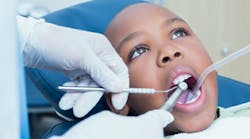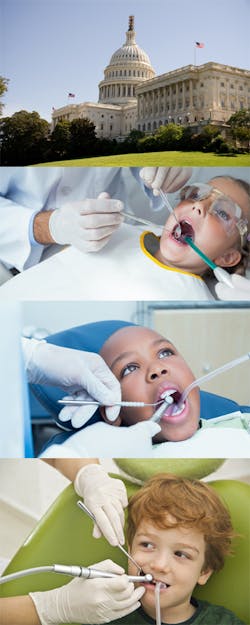CHIP and the dental lifeline: 4 questions with Kool Smiles’ Dr. D Ray Gifford
Federal lawmakers give two more years of dental benefits to uninsured children.
In March, Congress introduced the Medicare Access and CHIP Reauthorization Act of 2015, and on April 17, President Obama signed the bill into law. The act, which was widely hailed as a bipartisan achievement, reformed an unpopular, 18-year old method that tied doctor’s Medicare reimbursement rates to GDP production.
While the Medicare implications gained attention in the mainstream press, the act had important implications for the dental world as well. The act gave a last-minute extension to the Children’s Health Insurance Program (CHIP), meaning that tens of thousands of disadvantaged children will continue to have access to dental care at no cost.
CHIP provides free or low-cost dental care, medical checkups, prescriptions, and eye care for uninsured children up to age 19 who are not eligible for other government medical benefits.
For analysis of the dental impact of the Medicare Access and CHIP Reauthorization Act of 2015, we interviewed Dr. D Ray Gifford, Managing Dental Director for Kool Smiles. As one of the nation’s leading dental health providers for children, the leadership team at Kool Smiles has unique insight into the impact of CHIP—and what might happen if CHIP were to disappear.
Q: The two-year CHIP extension passed the US House of Representatives by a 392 to 37 vote. Given this, why do you think Congress has been reluctant to put a long-term funding plan in place for CHIP?
Dr. Gifford: The bill that passed both chambers by wide margins included many items beyond CHIP, so it is difficult to reach long-term conclusions on CHIP based on this. Since its founding, CHIP has enjoyed strong bi-partisan support that we think will continue. We are grateful for the two-year extension as this was an important step in continuing the gains made in improving oral health for our nation’s children.
Q: The impact of CHIP is widespread in the US. What would be the biggest impact for US children if CHIP were not in place?
Dr. Gifford: CHIP gives close to 10 million US children access to early, preventive dental care. At Kool Smiles, we’ve seen the benefit of the CHIP program firsthand. Many of the patients who come through our doors rely on CHIP for their dental coverage, which includes exams, emergency visits, X-rays, and fillings at little or no cost to the patient.
Kool Smiles recently ran an internal analysis of our CHIP pediatric dental patients who had visited a Kool Smiles dentist prior to their fourth birthday, comparing them to patients who had not seen a dentist before their fourth birthday. The results were telling: the CHIP-enrolled patients needed 34% fewer restorative and extraction procedures than their peers who had not seen a dentist by age four.
The bottom line is this: The CHIP program helps more kids access dental care at an early age, which leads to healthier teeth and mouths.
Q: How does Kool Smiles work to encourage families to take advantage of CHIP?
Dr. Gifford: Kool Smiles dentists are active in the communities they serve, creating awareness of the importance of oral health. Local offices participate in health fairs, engage with local charities and provide oral health education in schools.
Kool Smiles also makes downloadable oral health lesson plans and toothbrushes for students available to K-5 classrooms at no charge on its website. This type of education is vital to encouraging families to utilize their CHIP dental benefit.
Q: Do you think CHIP helps stabilize the dental industry, both in the short term and the long term?
Dr. Gifford: CHIP is a lifeline for patients and we are very encouraged to see more dental providers who are starting to accept CHIP and Medicaid patients. The emergence of the Dental Support Organization (DSO) model, where dentists contract with an outside firm for non-clinical and administrative support, has made a considerable impact improving access to dental care for low income families. The time and paperwork involved in processing claims for CHIP and Medicaid can dissuade a lot of dentists from seeing more than one or two Medicaid or CHIP patients per month. Fortunately, dentists who contract with DSOs who have the knowledge, processing programs, and infrastructure to manage these payers are now finding they can take on more of these patients. It will be important for the dental industry to continue innovating so we can better serve these patient populations.







